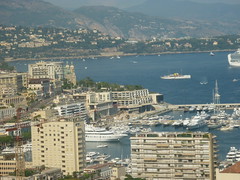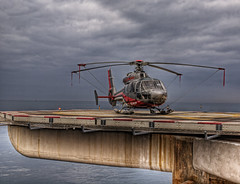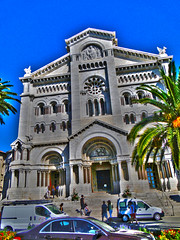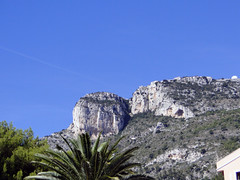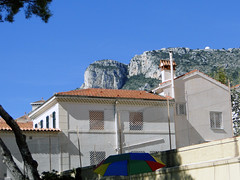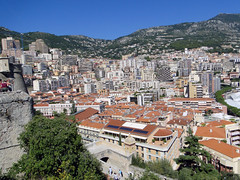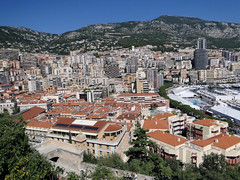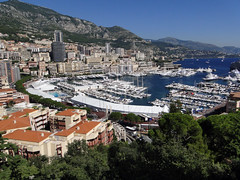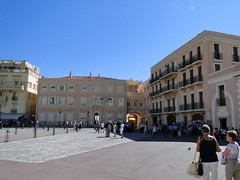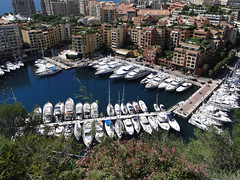 Monaco
Monaco
Monaco (English: /ˈmɒnək/; French: [mɔnako]), officially the Principality of Monaco, is a sovereign city-state and microstate on the French Riviera a few kilometres west of the Italian region of Liguria, in Western Europe, on the Mediterranean Sea. It is bordered by France to the north, east and west. The principality is home to 38,682 residents, of whom 9,486 are Monégasque nationals; it is widely recognised as one of the most expensive and wealthiest places in the world. The official language of the principality is French. In addition, Monégasque (a dialect of Ligurian), English and Italian are spoken and understood by many residents.
With an area of , it is the second-smallest sovereign state in the world, after Vatican City. Its make it the most densely-populated sovereign state in the world Monaco has a land border of and the world's shortest coastline of approximately ; it has a width that varies between . The highest point in the state is a narrow pathway named Chemin des Révoires on the slopes of Mont Agel, in the Les Révoires ward, which is above sea level. The principality is about from the border with Italy. Its most populous ward is Larvotto/Bas Moulins with a population of 5,443 as of 2008. Through land reclamation, Monaco's land mass has expanded by 20 percent. In 2005, it had an area of only .
The principality is governed under a form of constitutional monarchy, with Prince Albert II as head of state, who wields immense political power despite his constitutional status. The prime minister, who is the head of government, can be either a Monégasque or a French citizen; the monarch consults with the Government of France before an appointment. Key members of the judiciary in Monaco are detached French magistrates. The House of Grimaldi has ruled Monaco, with brief interruptions, since 1297. The state's sovereignty was officially recognised by the Franco-Monégasque Treaty of 1861, with Monaco becoming a full United Nations voting member in 1993. Despite Monaco's independence and separate foreign policy, its defence is the responsibility of France, besides maintenance of two small military units.
Economic development was spurred in the late 19th century with the opening of the state's first casino, the Monte Carlo Casino, and a railway connection to Paris. Since then, Monaco's mild climate, scenery, and gambling facilities have contributed to the principality's status as a tourist destination and recreation centre for the rich. In more recent years, Monaco has become a major banking centre and has sought to diversify its economy into the services sector and small, high-value-added, non-polluting industries. Monaco is famous as a tax haven: the principality has no personal income tax (except for French citizens) and low business taxes. Over 30% of the residents are millionaires, with real estate prices reaching €100,000 ($116,374) per square metre in 2018.
Monaco is not formally a part of the European Union (EU), but it participates in certain EU policies, including customs and border controls. Through its relationship with France, Monaco uses the euro as its sole currency; before, it used the Monegasque franc, which was pegged, and exchangeable with, the French franc until 1 January 2002. Monaco joined the Council of Europe in 2004 and is a member of the Organisation internationale de la Francophonie (OIF). It is also the host of the annual street circuit motor race, the Monaco Grand Prix, one of the original Grands Prix of Formula One. The local motorsports association gives name to the Monte Carlo Rally, hosted in January in the French Alps. The principality has a club football team, AS Monaco, which competes in the French Ligue 1 and have become French champions on multiple occasions, and a basketball team, which plays in the EuroLeague. A centre of research into marine conservation, Monaco is home to one of the world's first protected marine habitats, an Oceanographic Museum, and the International Atomic Energy Agency Environment Labs, which is the only marine laboratory in the United Nations structure.
History
Monaco's name comes from the nearby 6th-century BC Phocaean Greek colony. Referred to by the Ligurians as Monoikos, from the Greek "μόνοικος", "single house", from "μόνος" (monos) "alone, single" + "οἶκος" (oikos) "house". According to an ancient myth, Hercules passed through the Monaco area and turned away the previous gods. As a result, a temple was constructed there. Because this "House" of Hercules was the only temple in the area, the city was called Monoikos. It ended up in the hands of the Holy Roman Empire, which gave it to the Genoese.
An ousted branch of a Genoese family, the Grimaldi, contested it for a hundred years before actually gaining control. Though the Republic of Genoa would last until the 19th century, they allowed the Grimaldi family to keep Monaco, and, likewise, both France and Spain left it alone for hundreds of years. France did not annex it until the French Revolution, but after the defeat of Napoleon it was put under the care of the Kingdom of Sardinia.
In the 19th century, when Sardinia became a part of Italy, the region came under French influence but France allowed it to remain independent. Like France, Monaco was overrun by the Axis powers during the Second World War and for a short time was administered by Italy, then the Third Reich, before finally being liberated. Although the occupation lasted for just a short time, it resulted in the deportation of the Jewish population and execution of several resistance members from Monaco. Since then Monaco has been independent. It has taken some steps towards integration with the European Union.
Arrival of the Grimaldi family
Following a grant of land from Emperor Henry VI in 1191, Monaco was refounded in 1215 as a colony of Genoa. Monaco was first ruled by a member of the House of Grimaldi in 1297, when Francesco Grimaldi, known as "Malizia" (translated from Italian either as "The Malicious One" or "The Cunning One"), and his men captured the fortress protecting the Rock of Monaco while dressed as Franciscan friars – a monaco in Italian – although this is a coincidence as the area was already known by this name.
Francesco was evicted a few years later by the Genoese forces, and the struggle over "the Rock" continued for another century. The Grimaldi family was Genoese and the struggle was something of a family feud. The Genoese engaged in other conflicts, and in the late 1300s Genoa lost Monaco after fighting the Crown of Aragon over Corsica. Aragon eventually became part of a united Spain, and other parts of the land grant came to be integrated piecemeal into other states. Between 1346 and 1355, Monaco annexed the towns of Menton and Roquebrune, increasing its territory by almost ten times.
1400–1800
In 1419, the Grimaldi family purchased Monaco from the Crown of Aragon and became the official and undisputed rulers of "the Rock of Monaco". In 1612, Honoré II began to style himself "Prince" of Monaco. In the 1630s, he sought French protection against the Spanish forces and, in 1642, was received at the court of Louis XIII as a "duc et pair étranger".
The princes of Monaco thus became vassals of the French kings while at the same time remaining sovereign princes. Though successive princes and their families spent most of their lives in Paris, and intermarried with French and Italian nobilities, the House of Grimaldi is Italian. The principality continued its existence as a protectorate of France until the French Revolution.
19th century
In 1793, Revolutionary forces captured Monaco and until 1814 it was occupied by the French (in this period much of Europe had been overrun by the French armies under the command of Napoleon Bonaparte). The principality was reestablished in 1814 under the Grimaldis, only to be designated a protectorate of the Kingdom of Sardinia by the Congress of Vienna in 1815. Monaco remained in this position until 1860 when, by the Treaty of Turin, the Sardinian forces pulled out of the principality; the surrounding County of Nice (as well as Savoy) was ceded to France. Monaco became a French protectorate once again.
Before this time there was unrest in Menton and Roquebrune, where the townspeople had become weary of heavy taxation by the Grimaldi family. They declared their independence, hoping for annexation by Sardinia. France protested. The unrest continued until Charles III of Monaco gave up his claim to the two mainland towns (some 95% of the principality at the time) that had been ruled by the Grimaldi family for over 500 years.
These were ceded to France in return for 4,100,000 francs. The transfer and Monaco's sovereignty were recognised by the Franco-Monégasque Treaty of 1861. In 1869, the principality stopped collecting income tax from its residents—an indulgence the Grimaldi family could afford to entertain thanks solely to the extraordinary success of the casino. This made Monaco not only a playground for the rich, but a favoured place for them to live.
20th century
Until the Monégasque Revolution of 1910 forced the adoption of the 1911 Constitution of Monaco, the princes of Monaco were absolute rulers. The new constitution slightly reduced the autocratic rule of the Grimaldi family and Prince Albert I soon suspended it during the First World War.
In July 1918, a new Franco-Monégasque Treaty was signed, providing for limited French protection over Monaco. The treaty, endorsed in 1919 by the Treaty of Versailles, established that Monégasque international policy would be aligned with French political, military and economic interests. It also resolved the Monaco succession crisis.
In 1943, the Italian Army invaded and occupied Monaco, forming a fascist administration. In September 1943, after Mussolini's fall from power, the German Wehrmacht occupied Italy and Monaco, and the Nazi deportation of the Jewish population began. René Blum, the prominent French Jew who founded the Ballet de l'Opéra in Monte Carl…
Looking for places related to Monaco?
Those are other destinations to find places related to Monaco:

